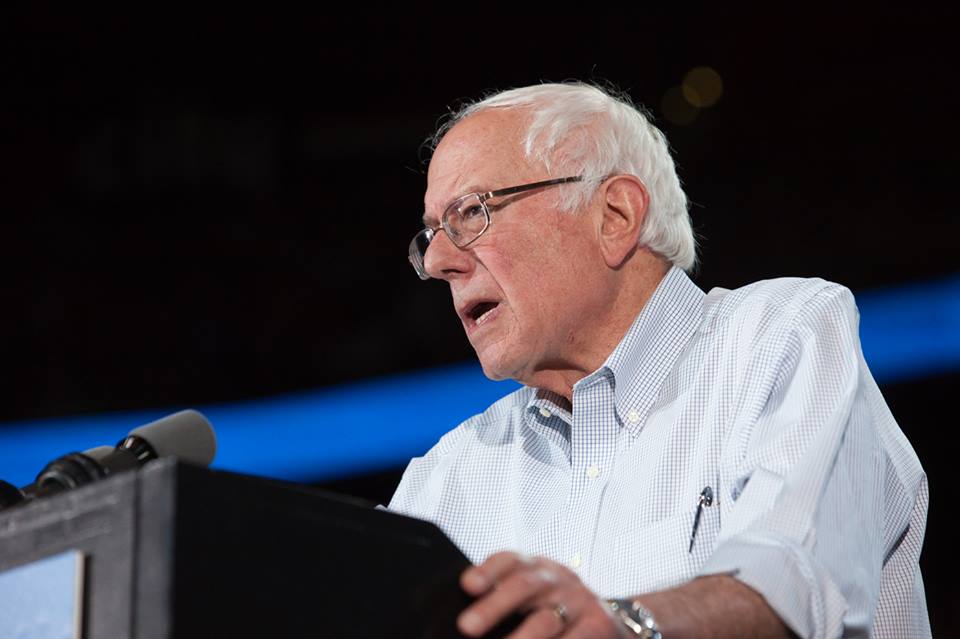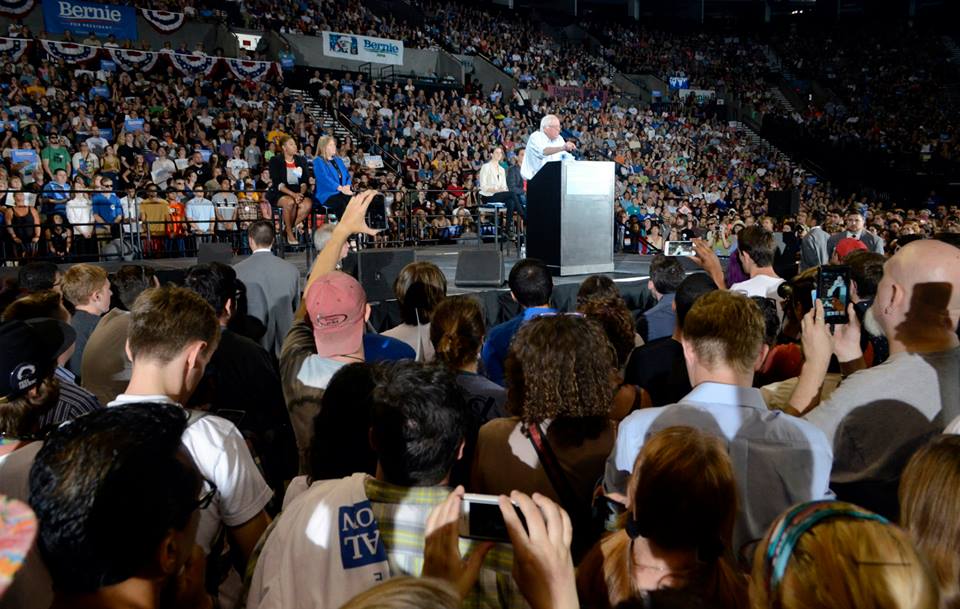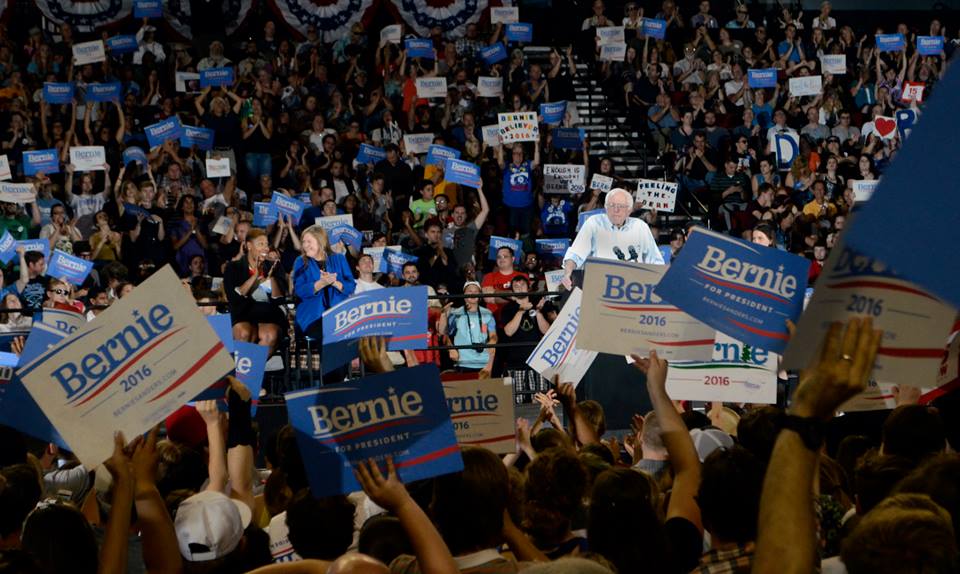
Sanders, socialist hopeful, gains in race against Clinton
He has always said that he is a socialist; he has always promoted progressive proposals on health, public education, Social Security and the environment.
He has always been a severe critic of imperial policies of interference and unjustifiable wars, and he always has pronounced himself on the side of the workers and the most vulnerable against the so-called One Percent Oligarchy that is usurping democracy in the United States.
Now he calls for a political revolution to rescue his country, that is, the positions that usually remain on the sidelines of the national political contests.
So far, those are the positions of the presidential candidate who — out of more than 20 presidential candidates in both parties — has attracted the largest crowds of likely voters. Surveys show that he already threatens the queen of the Democratic Party, Hillary Clinton, in some key states. Nobody predicted this development; nobody imagined it.
Senator Bernie Sanders amazes the political cupola and alarms other pre-candidates who are seeking the Democratic nomination for president, including the party’s grande dame. In recent weeks, his rallies have been five times larger than any of Clinton’s so far.
His message always wages a frontal attack on economic injustice and the famous 1 percent, a legacy of the Occupy Wall Street movement.
“The issue of wealth and income inequality is the great moral issue of our time, it is the great economic issue of our time, and it is the great political issue of our time,” he says. “We face a billionaire class that has bought our political system in order to enrich itself.”
In another speech, he said: “What this campaign does is to send a strong and clear message to the billionaire class — its greed is destroying the United States. This country belongs to all of us, not just a few billionaires.”
“Our campaign deals with creating a political revolution that tells the billionaire class that they can’t have it all. This country, this government belongs to us all. When we come together, when we don’t allow others to divide us because of the color of our skin or our sexual orientation, because a man or a woman was born in the United States or elsewhere, when we unite there is nothing, nothing that we can’t achieve,” he says, to the applause of his followers.
In his website, the message of welcome is “Are you ready to start a political revolution?” (https://berniesanders.com).
Sanders, who has always defined himself as a social democrat, is an independent Senator from Vermont. Previously, he was a representative (24 years in the House) and, before that, was the very popular mayor of Burlington, Vt.
Originally, though, he was a New Yorker from Brooklyn, where he and his followers were called “Sanderistas.” In fact, he was one of the critics of U.S. policy in Central America during those years.
He never had the support of the Democratic Party leadership and political leaders, analysts and commentators rule out his chances as a presidential candidate, never mind the possibility that he might make it to the White House.
But an important sector of the party base — especially the youth — surprises the experts and party leaders with its enthusiastic support for the 73-year-old politician, who is well known for his white, uncombed mane, and his simple, frank and furious rhetoric delivered with the accent of his native Brooklyn.
On Aug. 9, more than 20,000 people showed up for a Sanders rally in Portland, Ore. On Aug. 11, he attracted 27,000 or more supporters in Los Angeles (a number five times larger than any of Clinton’s public events, The Washington Post reported). Thousands have come to hear him in small and midsize cities, in numbers that occasionally surpass the crowds attracted by Barack Obama in his historic campaign in 2007.
Meanwhile, in cyberspace, more than 100,000 joined a live broadcast to 3,500 house parties in late July to listen to him speak from an apartment in Washington. His Facebook page contains 1.6 million names who “like” Sanders, almost half a million more than Clinton and a lot more than the other candidates of both parties. Tens of thousands of volunteers have joined his campaign.
His approval index has soared. A recent CNN poll showed Sanders only 6 points behind Clinton in New Hampshire, a state important not because of its size but for the fact that it holds the first primary election. A New Hampshire pollster had him in first place.
At the national level, he recorded an increase of 10 points in only one month, rising to 29 percent vis-à-vis 47 percent for Clinton. Both were far above the three candidates who followed.
Sanders’ campaign stands out because of the source of funds — an overwhelming majority of ordinary citizens — as compared with Clinton and the others, who get their money from a few billionaires. It is a campaign based on self-organization, where the senator generates a massive grassroots movement led by the bases, not political professionals.
Some opine that, like the Donald Trump phenomenon in the G.O.P., Sanders’ unexpected success is due to the fact that people are sick of professional candidates packaged by the political machine. This, even though Sanders has been a politician for more than three decades.
In contrast with Trump, Sanders has kept his commitment to certain progressive principles throughout his career and has confronted the established leadership. Trump is an integral part of that leadership. In fact, Sanders has denounced the billionaire for his anti-immigrant message, which he calls a shame for our country.
The consensus among experts is that Clinton’s huge political machine and billion-dollar funding will eventually crush all opposition, including the man who is now in second place.
However, almost everyone has to admit that Sanders’ presence has a substantial impact on this political contest and forces everyone — including Clinton — to broach the issue of the 1 percent against the 99 percent as one of the linchpins of the great electoral dispute in this country.
Meanwhile, the fact that Sanders’ message (and his anger) has massive resonance reveals the existence of a sector broader than anticipated by the experts — a sector headed by young people — that favors a profound progressive change, perhaps toward a political revolution in the U.S.
Maybe thanks to him, the word “socialist” will cease to be taboo in this country.
(Taken from the Mexican newspaper La Jornada)




